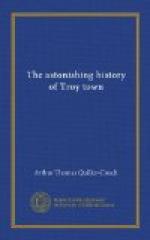Caleb was unusually silent during supper, and when his master grew cheery and related the adventures of the day, offered no comment beyond a series of mysterious sounds expressing mental discontent rather than sympathy. Finally, when Mr. Fogo had finished he looked up and began abruptly—
“Ef you plaise, sir, I wants to gie warnin’.”
“Give warning?”
“Iss, sir; notiss to go.” And Caleb stared fiercely at his master.
“But, my dear Caleb, you surely don’t mean—?”
“I do, tho’.”
“Are you dissatisfied with the place or the wages?”
“That’s et, sir—the wages.”
“If they are too low—”
“They bain’t; they be a darned sight too high.”
Mr. Fogo leant back in his chair.
“Too high!” he gasped.
“Look ‘ee here, sir: here be I, so lazy as La’rence, an’ eatin’ my head off ‘pon a pund a week an’ my small-clothes, on condishun I looks arter ’ee. Very well; what happens? ’Tes Dearlove, Dearlove, Dearlove all the time. Fust Tamsin brings ’ee back, and then Paul, an’ nex’ time I reckon ’twill be Peter’s turn. Where-fore, sir, seein’ I can’t offer to share wages wi’ the Twins, much less wi’ Tamsin, I wants to go.”
Caleb knocked the ashes out of his pipe, and, rising, stared at his master for some seconds and with much determination.
Mr. Fogo argued the case for some time without effect. But so sincerely did he paint his helplessness, and nervous aversion to new faces, that at length, after many pros and cons, Caleb consented to give him one more chance. “But mind, sir,” he added, “the nex’ time you’m brought home by a Dearlove, ‘go’ ’s the word.” On this understanding they retired to rest, but it was long before Mr. Fogo could shut his memory upon the panorama of the day’s experiences.
Let us return to the picnickers. After what had passed between Mrs. Goodwyn-Sandys and Mr. Moggridge on the river’s bank, it may seem strange that the lady should have chosen Sam Buzza to row her home, for the two youths were now declared rivals for her goodwill. But I think we may credit her with a purpose.
At any rate, when the lengthening shadows and retreating tide hinted return, Sam, who had arrived late in a designedly small dingey, asked Mrs. Goodwyn-Sandys to accompany him, and she, with little demur, complied. It did not matter greatly, as propriety would be saved by their nearness to the larger boats; and so the party started together.
But this arrangement, though excellent, did not last long; for, curiously enough, the dingey soon began to take a formidable lead of the next boat, in which the traitorous Moggridge was pulling stroke, and gazing, with what courage he could summon, into Sophia’s eyes. Indeed, so quickly was the lead increased, that at the end of two miles the larger boats had shrunk to mere spots in the distance.




